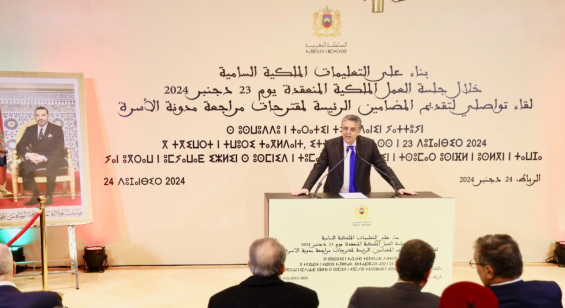In response to King Mohammed VI's instructions issued yesterday Monday, which emphasized the importance of communicating with the public to clarify the main contents of the Family Code revision and inform them of updates, several ministers organized a communication meeting today to discuss the prominent proposed amendments.
Custody, polygamy, and assets acquired during marriage...
During his speech, Minister of Justice Abdellatif Ouahbi said that the amendments include the possibility of validating marriage contracts for Moroccans residing abroad without the presence of Muslim witnesses if this proves impossible. Regarding marriage eligibility, he stated that it has been set at 18 years old for both males and females, with an exception to this rule setting the minor's age at 17 years, regulated by several conditions ensuring it remains exceptional.
Among the proposed amendments is the mandatory consultation of the wife during marriage contract documentation regarding her stipulation against polygamy, which must be recorded in the marriage contract. If non-polygamy is stipulated, the husband cannot take another wife in adherence to this condition.
In the absence of this stipulation, the «exceptional objective justification» for polygamy will be limited to: the first wife's infertility, a disease preventing marital intimacy, or other cases evaluated by the judge according to specific legal criteria of similar objectivity and exceptionality.
The proposed amendments make consensual divorce a direct contract between spouses without requiring judicial procedures and set a maximum period of six months for ruling on divorce cases.
Regarding the management of assets acquired during marriage, the proposals stipulate valuing the wife's household work and considering it a contribution to the development of assets acquired during marriage. They also adopt modern electronic means for divorce notifications, accepting power of attorney in these cases except during reconciliation and mediation phases.
Regarding custody, the amendments consider child custody a shared right between spouses during marriage, with the possibility of extension by agreement after divorce. They strengthen the right to housing for the custodial parent and establish new regulations for visitation rights and travel with children.
Additionally, a divorced mother's custody of her children will not be terminated upon her remarriage, and legal guardianship will be shared between spouses during and after marriage.
The amendments grant either spouse the right to retain the marital home in case of the other spouse's death, under conditions specified by law.
Regarding inheritance, the proposals allow individuals to gift during their lifetime whatever they wish to their heirs, with constructive possession replacing actual possession.
The Supreme Religious Council approves ten proposals
In his speech, Minister of Islamic Affairs Ahmed Toufiq stated that the Supreme Religious Council (Al-Majlis Al-Ilmi Al-A'ala), the highest Islamic scholarly body in Morocco, has approved ten matters as proposed by the committee tasked with reviewing the Family Code. These relate to marriage age, Muslim witnesses abroad, shared religious guardianship, considering household work as a contribution to spousal wealth, mandatory spousal maintenance upon contract, compulsory lifetime housing rights for the surviving spouse, priority of spousal debts related to acquired assets, continuation of custody rights for remarried women, compensation for women seeking divorce, and equality between grandchildren (from both sons and daughters) in mandatory bequest rights regardless of descent.
The Minister also confirmed that there are three issues where the committee provided alternative solutions that comply with Islamic law (Sharia) and achieve the desired objectives. These concern the status of children born outside marriage, where an alternative solution requires the father to bear responsibility for the child's needs like the mother, without establishing lineage, as this would contradict both Sharia and the constitution and would undermine the institution of family.
The second matter concerns bequests to heirs when other heirs don't approve, with the alternative solution being gifts instead of bequests, without requiring actual possession. The third issue relates to the elimination of agnatic inheritance when daughters are left without sons, with the alternative solution being gifts to daughters without requiring actual possession.
There are two additional matters where the committee provided alternative solutions that comply with Sharia and achieve the desired objectives, which can be decided by the person concerned (Wali Al-Amr) according to the interest. These concern inheritance between spouses of different religions and inheritance between foster parents and children, with various proposed solutions including the possibility of wills, gifts, and mandatory bequests as determined by law.
There is also one matter where the committee's opinion can only be overridden by the person in question's decision based on public interest, concerning the inclusion of the first wife's consent for polygamy. While the committee does not support making this consent mandatory, the person in question can decide to include it as a requirement.
The meeting was attended by prominent officials including Prime Minister Aziz Akhannouch, Minister of Solidarity, Social Integration and Family Naeima Bennihia, Speaker of the House of Representatives Rachid Talbi Alami, Speaker of the House of Advisors Mohamed Hanine, and various other high-ranking government officials, heads of constitutional institutions, and members of the committee charged with reviewing the Family Code.




 chargement...
chargement...












